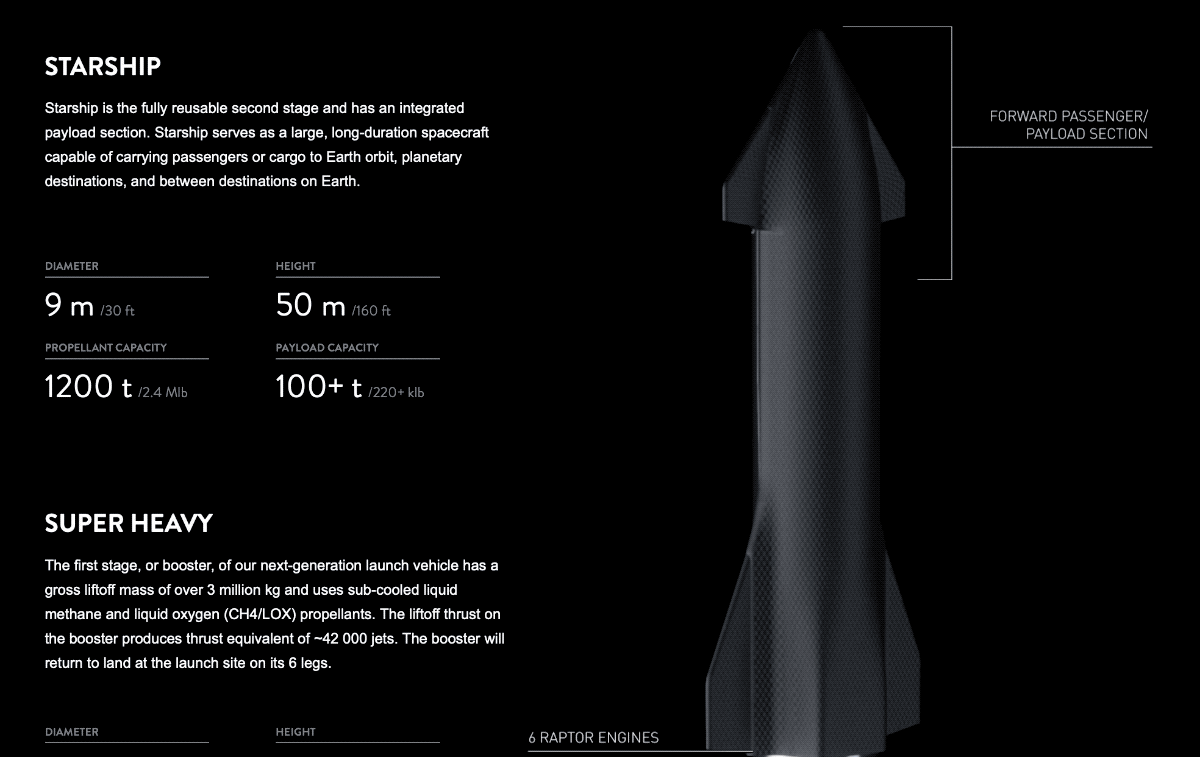SpaceX details Starship and Super Heavy in new website
After CEO Elon Musk shared new details about its in-development Starship spacecraft on Saturday, SpaceX has updated its website with a new section dedicated to the fully reusable cargo and passenger vehicle. The new Starship website also provides a bunch of info about Super Heavy, the first-stage booster that will propel Starship to orbital altitudes and beyond.
Starship, once complete, will be "world's most powerful launch vehicle," according to SpaceX, with a cargo capacity of 100 metric tons (that's over 220,000 lbs) to Earth orbit. With orbital refueling, it'll also be able to take its freight - and passengers - to the Moon, Mars and beyond.
Per the new Starship site, the final vehicle will be 160 feet tall (without the booster) and 30 feet in diameter, with a propellant capacity of 1,200 metric tons of liquid methane and liquid oxygen. Payload, and crew depending on configuration, will occupy the top third of the rocket, while the bottom two-thirds will house the propellant and six Raptor engines, including three for atmospheric flight and three for propulsion in space. At the top of the rocket there are two actuated (meaning you can control their movement) fins that will move to orient the rocket for re-entry and landing. At the bottom, two large fins will also help produce drag, crucial for its controlled descent. Starship will be made of stainless steel, and one half of its surface will be covered in glass tiles to take the brunt of the worst of the heat upon atmospheric entry.
As for Super Heavy, it'll have the same 30-foot diameter, but be much taller, at 223 feet, with a propellant capacity of a massive 3,300 metric tons, and a thrust capability of 72 meganewtons (MN) (the thrust of the Saturn V rocket was only 35 MN, by comparison). Actuated grid fins near the top of the rocket will be used for its controlled landing, much like those found on the Falcon 9 boosters SpaceX uses today. The bigger booster will have 37 Raptor engines, however, and six landing legs for stability when it comes back down to be readied for re-use. It'll be made entirely of stainless steel.
SpaceX notes that Starship is used to deliver satellites at "a lower marginal cost per launch" compared to Falcon, and that the design of its cargo compartment will provide the largest potential cargo fairing of any current planned space freight vehicle. This will allow it to carry even very large objects like assembled space telescopes, the company notes.
It's also designed to continue to service the International Space Station with cargo resupply, and would be able to transport a lot more cargo in one go than the current Dragon capsules SpaceX uses. It's also designed to be able to deliver cargo and people to the Moon and other planets, and to return for multiple trips.
SpaceX also provided updated specs for the Raptor engine that will power the Starship system. Each Raptor will be 4 feet in diameter, 10.2 feet high and have a thrust capability of 2 MN (which is just over the thrust force of the Space Shuttle's main engine during takeoff, coincidentally).
On the site, SpaceX says it's targeting orbital flight for Starship in 2020, and at the event Musk went further still, saying that Starship should attain this milestone in less than six months - and even allowed for the possibility that it could fly with people on board in one year.
